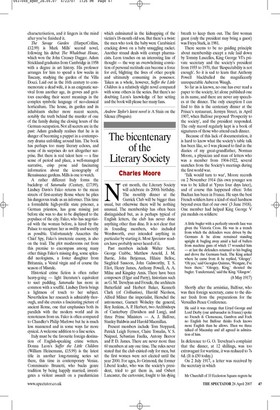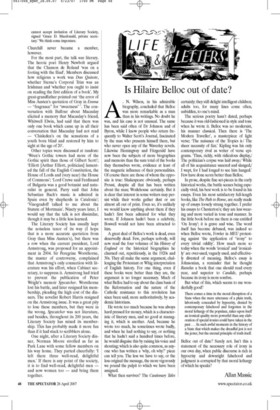The bicentenary of the Literary Society
Charles Moore
Next month, the Literary Society will celebrate its 200th birthday. The monthly dinner at the Garrick Club will be bigger than usual, but otherwise there will be nothing unusual. The membership has often been distinguished but, as is perhaps typical of English letters, the club has never done anything other than dine. It is not clear that its founding members, who included Wordsworth, ever intended anything in particular by starting it. Most Spectator readers have probably never heard of it.
Past members include Walter Scott, George Crabbe, Matthew Arnold, J. M. Barrie, John Betjeman, Hilaire Belloc, Siegfried Sassoon, John Galsworthy, T. S. Eliot, Henry James, Anthony Powell, A. A. Milne and Kingsley Amis. There have been composers (Elgar and Parry), historians such as G. M. Trevelyan and Froude, the architects Butterfield and Herbert Baker, Kenneth Clark (of Civilisation), Harold Nicolson, Alfred Milner the imperialist, Herschel the astronomer, Garnett Wolseley the general, Roy Jenkins, A. P. Herbert, two Archbishops of Canterbury (Davidson and Lang), and three Prime Ministers — A. J. Balfour, Stanley Baldwin and Harold Macmillan.
Present members include Tom Stoppard, Patrick Leigh Fermor, Claire Tomalin, V. S. Naipaul, Sebastian Faulks, Antony Beevor and P. D. James. There are never more than 60 members at any one time. The rules never stated that the club existed only for men, but the first women were not elected until the year 2000. For ages, Jo Grimond, the former Liberal leader, who was the society’s president, tried to get them in, and Osbert Lancaster, the cartoonist, fought to his dying breath to keep them out. The first woman guest (only the president may bring a guest) was Freya Stark, in 1981.
There seems to be no guiding principle about membership except a rule laid down by Tommy Lascelles, King George VI’s private secretary and the society’s president from 1955 to 1970, that ‘Respectability is not enough’. So it is sad to learn that Anthony Powell blackballed the magnificently unrespectable Auberon Waugh.
So far as is known, no one has ever read a paper to the society, let alone published one in its name, and there are never any speeches at the dinner. The only exception I can find to this is the centenary dinner at the Prince’s restaurant, Jermyn Street, in April 1907, when Balfour proposed ‘Prosperity to the society’, and the president responded. The only record regularly kept is a book of signatures of those who attend each dinner.
Because of this lack of documentation, it is hard to know what the society’s table talk has been like, so I was pleased to find in the diaries of my great-grandfather, Norman Moore, a physician and man of letters who was a member from 1904-1922, several snatches from the Society’s meetings during the first world war.
‘Talk would turn to war’, Moore records on 2 November 1914 (his own younger son was to be killed at Ypres four days later), and of course this happened often: ‘John Buchan has been in France. He says the best French soldiers have a kind of steel hardness beyond even that of our own’ (3 June 1918). One member had helped King George V pin medals on soldiers:
A little bugler with a perfectly smooth face was given the Victoria Cross. He was in a trench from which the defenders were driven by the Germans & he alone remained standing upright & bugling away amid a hail of bullets from machine guns of which 17 wounded him — at last the defenders returned to his bugling and drove the Germans back. The King asked where he came from & he replied, ‘Glesgey’. ‘Oh yes,’ said Georgius Quintus, ‘Westgate, I’ve been there.’ ‘Glesgey, King,’ shouted the bugler. ‘I understand,’ said the King. ‘Glasgow’.
(8 May 1917) Shortly after the armistice, Balfour, who was then foreign secretary, came to the dinner fresh from the preparations for the Versailles Peace Conference.
He said it was strange that Lloyd George and Lord Derby (our ambassador in France) spoke no French & Clemeneau, Gambon and Foch no English but Balfour thinks Foch knows more English than he allows. Then we three talked of Macaulay and all agreed in admiration of him.
In deference to G. O. Trevelyan’s complaint that the dinner, at 12 shillings, was too extravagant for wartime, it was reduced to 7s 6d. (It is £50 today.) On 2 July 1917, a letter was received by the secretary in which
Mr Churchill of 33 Eccleston Square regrets he cannot accept invitation of Literary Society, signed ‘Grace D. Macdonald, private secretary.’ We think some imposture.
Churchill never became a member, however.
For the most part, the talk was literary. The heroic poet Henry Newbolt argued that the Chanson de Roland ‘was on a footing with the Iliad’. Members discussed how religious a work was Don Quixote, whether Sterne’s Corporal Trim was an Irishman and ‘whether you ought to insist on reading the first edition of a book’. My great-grandfather pointed out ‘the error of Miss Austen’s quotation of Gray in Emma — “fragrance” for “sweetness” ’. The conversation with Balfour about Macaulay elicited a memory that Macaulay’s friend, Whitwell Elwin, had said that there was only one book which came up in all their conversation that Macaulay had not read — ‘Chisleden’s on the sensations of a youth born blind and restored by him to sight at the age of 20’.
Other topics were discussed at random: ‘Wren’s Gothic towers had more of the Gothic spirit than those of Gilbert Scott’; ‘Elliott [Arthur Elliott, politician] lamented the fall of the English Constitution, the House of Lords and (very near) the House of Commons’; ‘Lord Crewe said Ferdinand of Bulgaria was a good botanist and naturalist in general. Parry said that John Sebastian Bach’s music is admired in Spain even by shepherds in Catalonia’; ‘Vinogradoff talked to me about the Statute of Mortmain’. Ninety years later, I would say that the talk is not dissimilar, though it may be a little less learned.
The Literary Society has usually kept the noiseless tenor of its way (I hope that is a more accurate quotation from Gray than Miss Austen’s), but there was a row when the current president, Lord Armstrong, was proposed for an appointment in 2004. Sir Peregrine Worsthorne, the master of controversy, complained that Armstrong’s only connection with literature was his effort, when Cabinet secretary, to suppress it. Armstrong had tried to prevent the publication of Peter Wright’s memoir Spycatcher. Worsthorne lost his battle, and later resigned his membership, pleading the high cost of the dinners. The novelist Robert Harris resigned on the Armstrong issue. It was a great pity to lose these members, but they were in the wrong. Spycatcher was not literature, and besides, throughout its 200 years, the Literary Society has mixed its membership. This has probably made it more fun than if it had stuck to scribblers alone.
One night, after a Literary Society dinner, Norman Moore strolled as far as Park Lane with some fellow members on his way home. They parted cheerfully: ‘I left there three well-read, delightful men.’ If there is any point of the society, it is to find well-read, delightful men and now women too — and bring them together.

























































 Previous page
Previous page